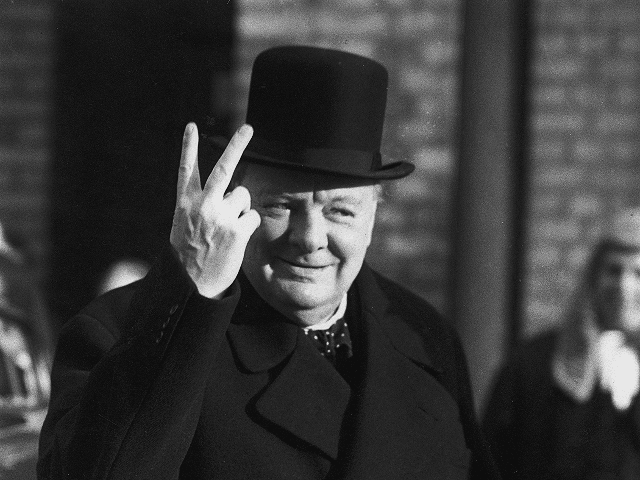Sir Winston Churchill’s grandson, Sir Nicholas Soames, has joined a prominent historian for a comprehensive fisking of the case against the wartime leader advanced by left-wing academics at a Churchill College seminar.
Priyamvada Gopal, Onyeka Nubia, Kehinde Andrews, and Madhusree Mukerjee had slated the British icon at the college bearing his name in a seminar titled The Racial Consequences of Mr Churchill, in which he was described as “the perfect embodiment of white supremacy” and the empire he led to victory over Hitler’s Germany branded “far worse than the Nazis.”
These and other charges have now been rebutted in a Policy Exchange paper written by historian Andrew Roberts, author of Churchill: Walking with Destiny, and Zewditu Gebreyohanes, a former intern of the late conservative philosopher Sir Roger Scruton, with a foreword by Sir Nicholas Soames.
Sir Nicholas, who was like his grandfather a Conservative parliamentarian until the last election, described The Racial Consequences of Mr Churchill as “a new low in the current vogue for the denigration in general of British history and of Sir Winston Churchill’s memory in particular”, something he noted is “now sadly quite common” — but not something he would have expected to see from Churchill College.
“This College, the first one at Cambridge University to be named after a person living at the time of its founding, is the National and Commonwealth Memorial to Sir Winston Churchill and was to be the embodiment of his vision of how higher education can benefit society in the modern age,” Sir Nicholas recalled.
“The College benefits enormously from Churchill’s name. If they traduce it, should they be able to have their cake and eat it?” he asked, suggesting that, for once, an institution named for a historical figure should be rebranded not to appease woke activists, but because it no longer deserves the association.
My & Zewditu Gebreyohanes & Nick Soames' reply for Policy Exchange to the attacks on Churchill at Churchill College this month: https://t.co/1LaHP8d102 Using history & facts, we dissect, & hopefully rebut, the allegations of Churchill's detractors #Churchill #WinstonChurchill
— Andrew Roberts (@aroberts_andrew) February 28, 2021
In the paper proper, the claims of Gopal, Nubia, Andrews, and Mukerjee were subject to a forensic interrogation, with some of their claims, as Sir Nicholas Soames put it, turning out to have been “idiotically sloppy”.
On one occasion, for example, the anti-Churchill academics had suggested that Churchill “wasn’t even that popular at the time… he was never elected”, which Roberts and Gebreyohanes easily disproved with reference to Gallup polling showing he consistently enjoyed approval ratings of 78 to 93 per cent throughout his wartime premiership, increased his constituency majority by around 5,000 votes in the 1945 general election, and led the Conservative Party back into government in the 1951 general election.
Roberts and Gebreyohanes were able to highlight similarly fundamental errors elsewhere in their paper, such as Onyeka Nubia at one point confusing Labour politicians Aneurin Bevan and Ernest Bevin, and Kehinde Andrews — Britain’s inaugural professor of “Black Studies” — making a “baffling claim that “the temperature of the earth […] rose” as a result of Europeans’ “alleged genocide” of indigenous peoples in the Americas, which appears — they said — to have no basis in reality.
Churchill’s supposed culpability for the Bengal Famine, advanced by non-historian Madhusree Mukerjee without challenge, was also debunked at length, with reference to research by “scholars such as Amartya Sen, Arthur Herman and Tirthankar Roy”.
“Churchill authorised the sending of over 130,000 tonnes of Iraqi and Australian grain to Bengal; by the end of 1944 a total of 1 million tonnes of grain had been sent,” Roberts and Gebreyohanes noted, highlighting Churchill’s instructions that “Every effort must be made, even by the diversion of shipping urgently needed for war purposes, to deal with local shortages” and the enormous pressures the British faced, with the Japanese “at the gates of India” and their submarines prowling the shipping lanes.
Churchill College Hosts Anti-Churchill Talk: 'Embodiment of White Supremacy', British Empire 'Far Worse' Than Nazis https://t.co/a6eTjrqL4u
— Breitbart London (@BreitbartLondon) February 14, 2021
“It appears that the panellists were chosen deliberately to portray just one side of an argument without any opportunity to challenge their narrative,” the Policy Exchange paper concluded, after examing several other charges against the wartime premier and finding all of them wanting.
“What is especially perplexing is that Churchill College, the National and Commonwealth memorial to Sir Winston Churchill, should of
all institutions in the land have organised an event of such clearly premeditated malice and character assassination,” its authors added, saying they hoped their rebuttal would help to set the record straight and finishing with one Churchill’s own famous lines:
“Truth is incontrovertible. Panic may resent it. Ignorance may deride it. Malice may distort it. But there it is.”

COMMENTS
Please let us know if you're having issues with commenting.